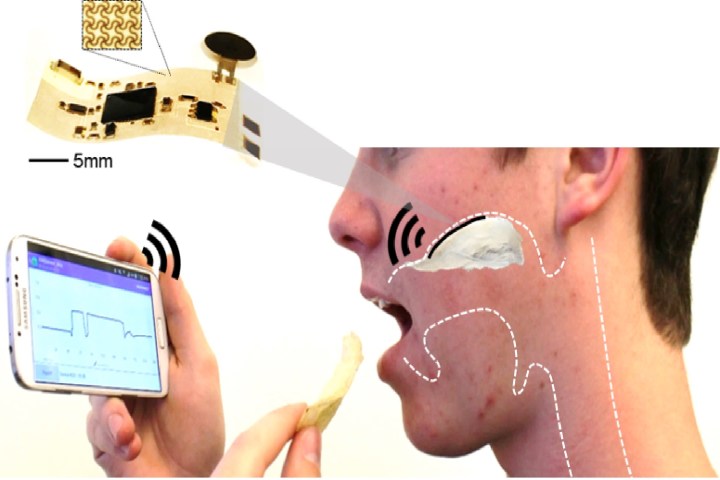
Keeping track of your sodium intake is very important if you’re among the 1 in 3 American adults who suffer from high blood pressure. Physicians will advise you to opt for low-salt options when it comes to choosing and eating food, but keeping track of exactly how much salt is passing your lips isn’t easy. That could soon change, however, thanks to a new electronic sensor developed by researchers at the Georgia Institute of Technology.
Their stretchable sodium-measuring device could possibly be embedded in a dental retainer, and used to provide highly sensitive, real-time monitoring of sodium intake. The information could then be sent directly to your phone or other mobile device to provide feedback, guidance, and — if necessary — the occasional admonishment.
“The intraoral electronics can measure the amount of sodium from food intake on a daily basis, which is used to control someone’s eating behavior directly related to diseases such as hypertension, diabetes, and obesity,” Dr. Woonhong Yeo, whose lab carried out the research, told Digital Trends. “We [have] already developed prototype devices and proved the device functionality with a human study. With the customized Android application, real-time sodium intake from veggie juice, chicken noodle soup, and potato chips was clearly measured and data wirelessly sent to a smartphone or tablet.
In the research team’s prototype version of the sensor, its power source is a rechargeable microcoin battery capable of providing continuous measurements for 12 hours. Since most of us aren’t waking up in the middle of the night to snack on chips (if you are, quit pretending that’s normal), this would be long enough to cover our waking, food-consuming hours. However, the researchers have plans to make it even more efficient and less intrusive.
“The next step is to further miniaturize the device, such that it can be simply laminated on a tooth,” Yeo said. “We are very interested in commercialization of this technology and device. Currently, we are waiting to get contacts from interested companies.”
A paper describing the research, “Wireless, intraoral hybrid electronics for real-time quantification of sodium intake toward hypertension management,” was recently published in the journal PNAS.


